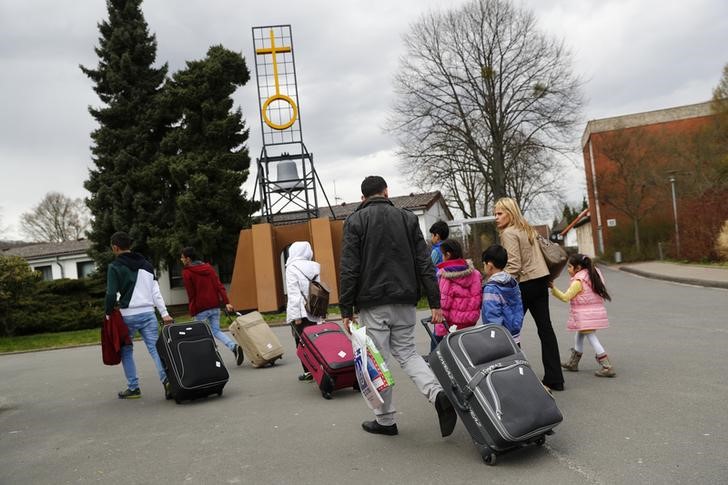
Syrian refugees arrive at the camp for refugees and migrants in Friedland, Germany April 4, 2016. REUTERS/Kai Pfaffenbach
December 23, 2017
BERLIN (Reuters) – Leading figures from Angela Merkel’s conservatives and the Social Democrats (SPD) outlined differing visions on how their possible government would approach immigration, as Germany’s would-be coalition partners prepared for talks in the New Year.
Chancellor Merkel’s 2015 decision to open the doors to more than a million migrants, many fleeing war in the Middle East, transformed Germany’s demographic landscape and boosted the far right, hurting her bloc and the SPD in September’s election.
In separate interviews, Thomas Strobl, deputy leader of Merkel’s Christian Democrats (CDU) and SPD foreign minister Sigmar Gabriel outlined ways of winning back disenchanted supporters.
Strobl told the Heilbronner Stimme newspaper Germany should cap the number of new immigrants at 65,000 a year, the level in 2012, and far below the limit of 200,000 that the conservatives had previously advocated.
But Gabriel, whose party’s restive membership would be unlikely to accept such a draconian cap, suggested municipalities around Germany and Europe could be compensated financially if they agreed to shelter refugees.
“That way municipalities would decide themselves how many refugees to take,” he told the Funke newspaper group. “That would avoid citizens gaining the impression that refugees get everything and we get nothing.”
Germany has argued in vain for the stream of migrants fleeing war and poverty in the Middle East and Africa to be divided proportionately between the European Union’s member states, with poorer, more ethnically homogenous eastern members particularly set against the idea.
“The EU could establish a program to help municipalities in poorer countries with the financing,” Gabriel added.
Merkel, for whom a renewed conservative-SPD ‘grand coalition’ is her best chance of securing a fourth term as chancellor, has blamed her Sept. 24 election losses on concern at migration and now favors a tougher stance on deporting migrants accused of crimes.
The SPD’s membership, which must ratify any government deal, is cautious about repeating the experience of a grand coalition, for which voters rewarded it with a drubbing in the polling booths.
While Gabriel is not a member of the SPD’s negotiating team, his proposal could prove popular with the party’s broadly more pro-European rank-and-file, and especially with party leader Martin Schulz, a former European Parliament president.
Exploratory talks between the parties are due to begin on Jan. 7, and Merkel hopes to reach a deal by mid-January.
(Reporting by Andrea Shalal and Thomas Escritt; Editing by Robin Pomeroy and Stephen Powell)
